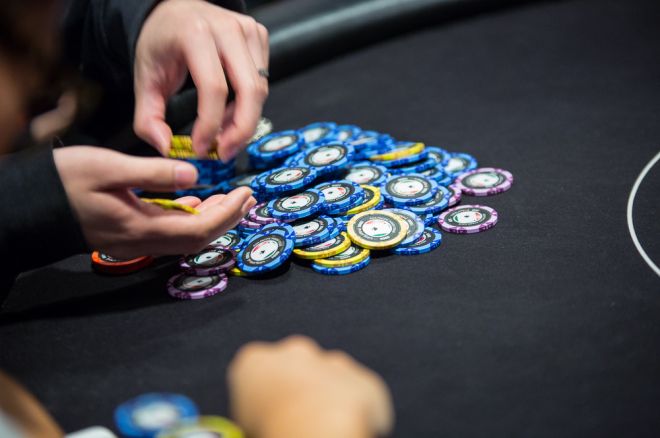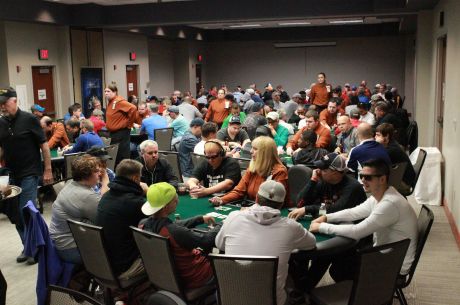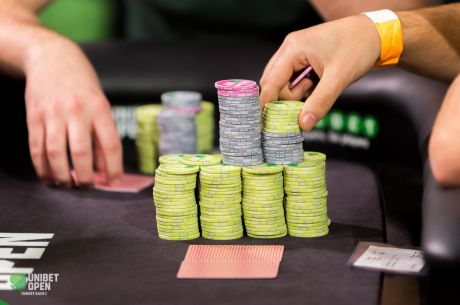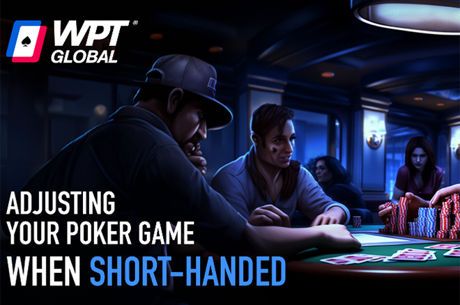Leaving to Lock Up a Win? Don’t Get Up from a Good Poker Game

“After I’ve won a pot in No-Limit... I’m in the next pot — regardless of what two cards I pick up. And if I win that one... I’m always in the next one. I keep playing every pot until I lose one. And, in all those pots, I gamble more than I normally would.”
~Doyle Brunson
When I first began playing poker, I made a decision early on to start keeping track of my wins and losses. I did so in one of the those black leather Moleskine notebooks, the kind that can easily fit in your pocket. I noted the game and the stakes, had another column noting the “+” or “-” of the session, then over on the far right I’d record the running total.
During those early days I also read strategy books and articles, spent a lot of time on the forums, and did other things away from the tables to try to improve as a player. But looking back I can say that probably the most important factor helping me getting better — and helping me continue to win more than I lost — was to make that simple act of post-session score-keeping part of my routine every single time I played.
These things work differently for different people, but I’d say part of the benefit of keeping a ledger like this is psychological. Knowing you’re moving upwards over the long term helps make it much easier to absorb a single-session loss, or even a downward swing lasting several sessions or weeks. There’s also a more tangible benefit to such record-keeping, as it helps identify patterns highlighting whether or not certain games and/or stakes might be less profitable for you.
When playing online I’d also record the number of hands I played in a given session, and in fact that helped me see more readily how playing longer sessions often produced lower win rates for me. Of course, when playing online you often have an option to employ tracking programs that automatically record all of this information (and more) for you. But I found an added benefit in writing the figures down in my Moleskine notebook, as just the process of doing so forced me to think more specifically about what they represented.
That’s a recommendation then — keep records of your play, and use the information that you’re recording to inform game selection, help with bankroll management, and give you an idea whether or not you’re a winning player.
I wanted, though, to highlight something else today — something I know to have been a longtime leak in my game that I believe can be traced back to this record-keeping habit of mine. I was recently made to think about this leak again after reading an article that appeared here by Nathan Williams titled “Want to Move Up, But Do You Suffer from ‘Small Stakes Paralysis’?” which in part addresses how a fear of failure in poker can inhibit your potential as a player.
Sometimes near the end of session my determination to record a “+” rather than a “-” in that column for session results would encourage more tight, timid play. Perhaps you’ve experienced something similar, this desire to lock up a win causing you to fold your last few hands rather than risk not finishing in the black for the day. That’s obviously going to increase the likelihood that you to play hands less well by making less effective decisions.
But for me sometimes this tendency to want to preserve a “win” would emerge even earlier, particularly when playing online where where it’s a lot simpler just to log off and introduce an arbitrary endpoint to a session than is the case when playing live. You ever experience this?
You manage an early double-up, or, say, pick up several pots during the tables’ first two orbits to increase your stack by 50%. What happens next for you? If you win early in a cash game, are you more inclined both to stay and to continue playing your normal game, or even become more loose and/or aggressive? Or are you less inclined to gamble, playing fewer hands and/or a tighter game in an effort (conscious or otherwise) to preserve what you’ve won?
I’m curious...
The Doyle Brunson quote up above comes from his much read no-limit hold’em chapter in Super/System, appearing during a discussion of “rushes” in poker. “If you’re going to have a rush... you’ve got to let yourself have one,” advises Brunson, leading him to the point that winning pots in no-limit hold’em encourages him not only to keep playing but to ramp up the aggression, too.
Writing during the late 1970s, the “power poker” he played and which he there encouraged his readers to play was a lot less prevalent than is the case today. But regardless of changing trends in playing styles, it makes sense to want to play more when you’re ahead in a game. Put differently, there is something counterintuitive to being less inclined to play after winning.
Why do I say this? I can think of three reasons.
We all know that in poker you can play your best and still lose. You can also play terribly and still win. However, we also know that in poker if you win the chances are greater that you are playing better and making better decisions than is the case when you lose. That’s one reason to keep playing after winning — chances are you’re probably playing well, and overall you want to play more hands when you’re playing well than when you aren’t.
By the same token, if you are winning chances are also greater that your opponents aren’t playing as well as you are, or at the very least that you’re making better decisions more frequently than they are. Again, this isn’t necessarily going to be true — you might be up in the session thanks to dumb luck, not your prowess over others at the table. Still, if you’re winning, there’s a likelihood that you’ve found a good game and it is worth sticking around. (Conversely, if you’re losing you may well be in a bad game, and thus probably should be thinking of getting up and resisting the urge to try to win back what you’ve lost.)
The third reason to stay has to do with what happens to your table image after winning. I’m one of those who tends not to be swayed too much by talk of “rushes” in poker, especially when such talk starts entertaining ideas that your chances of being dealt a good hand somehow go up or down based on what has happened recently. That’s because on one level, each hand is obviously an independent event, and should be approached as such.
That said, on another “meta” level each hand also comes as part of a sequence of other hands, and while what happens in those other hands doesn’t affect how the cards come out, it can affect how players play those cards going forward. Winning pots tends to earn your opponents’ attention, affecting how they play against you in subsequent hands. If you’ve won several pots but have only shown down strong hands, the idea that you “always have it” might have begun to form in other players’ heads. If you’ve gotten lucky to win those pots and show down a hand or two that shows you did, that, too, creates a lasting impression.
In either case, by winning you very likely have an image that can be favorable to you going forward. And in a lot of cases that image includes an impression that you are a good player, which can be good for a number of reasons. This is the idea at the heart of Brunson’s advice to get back in there right after winning a hand, something he’ll do “regardless of what two cards I pick up.”
All of which is to say, if you happen to feel an urge to get up from the table whenever you find yourself up in a session, think about whether you are leaving for good reasons or are cutting short your play simply to lock up that win. Chances are you should be staying — and playing.
Want to stay atop all the latest in the poker world? If so, make sure to get PokerNews updates on your social media outlets. Follow us on Twitter and find us on both Facebook and Google+!









